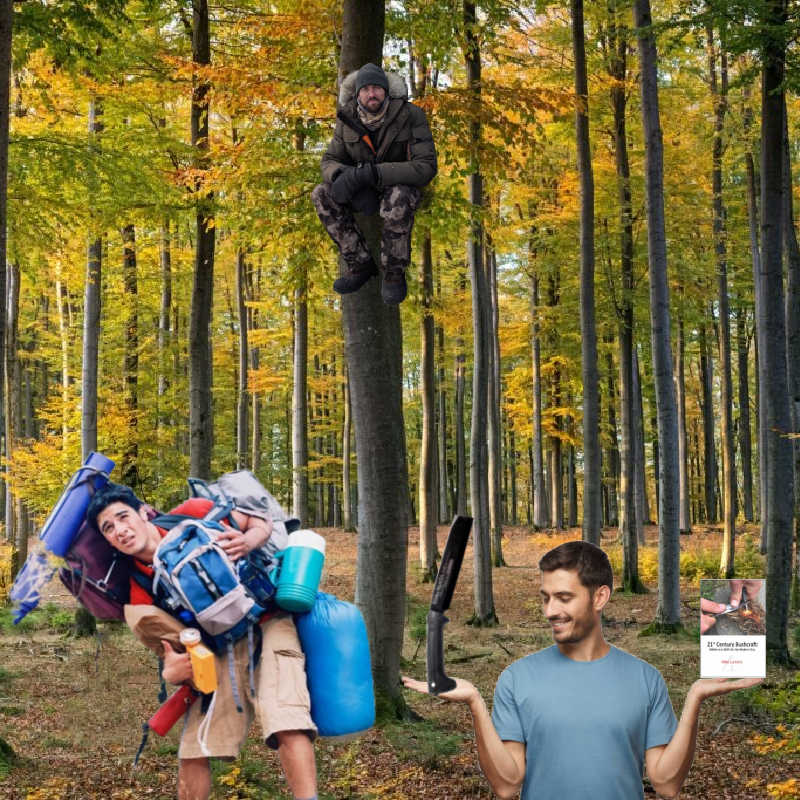
Skills vs. Supplies: What Matters More in Survival?
In a survival situation, whether in the wilderness, facing a natural disaster, or navigating an urban crisis, two things can determine the outcome: the skills you possess and the supplies you have on hand.
The age-old debate between skills versus supplies has been central to survival preparedness, with some emphasizing the importance of skills like fire-making and foraging, while others argue that having the right tools and resources can be a game-changer.
So, what really matters more in survival situations: your skills or your supplies?
Today let's explore both sides, examining the benefits and limitations of each, and highlights why a balanced approach may be the best way to maximize your chances of survival.
The Case for Skills: Knowledge is Power
When it comes to survival, skills are invaluable. Knowledge can make the difference between surviving and thriving...or even between life and death. Survival skills enable you to improvise, adapt, and find resources in your environment, even if you don’t have a lot of equipment.
Adaptability and Resourcefulness
Survival skills allow you to adapt to whatever situation you find yourself in.
Whether you’re stranded in a remote area, dealing with limited resources, or facing harsh weather conditions, having survival skills means you can make use of the materials around you.
Skills like building a shelter from natural materials, purifying water, identifying edible plants, and creating fire without matches or a lighter all require adaptability and creativity—abilities that no gear can replace.
For example, if you know how to find and purify water, you’re less dependent on carrying large quantities with you.
Similarly, if you know how to start a fire without matches, you won’t rely on a single piece of equipment that could get lost or damaged. Skills make you versatile and reduce your dependence on external supplies.
Sustainability in Long-Term Survival
In a long-term survival scenario, skills are even more important. Supplies are finite; they can be used up, damaged, or lost.
Knowing how to catch fish, set traps, forage, and hunt are sustainable ways to gather food indefinitely. Similarly, understanding how to build and maintain a shelter means you won’t be at the mercy of a single tarp or tent.
Take foraging as an example: Someone with the skill to identify edible and medicinal plants has access to an ongoing supply of food and resources for medicine.
Compare this to someone who relies on pre-packaged rations, which will inevitably run out.
Examples of Essential Survival Skills
Here are a few survival skills that can make a significant impact in a variety of scenarios:
- Fire Starting: Techniques like the bow drill or fire plow allow you to make fire without matches, lighters, or other equipment.
- Water Purification: Knowledge of natural water sources, solar stills, or filtration using rocks, sand, and charcoal can help ensure safe drinking water.
- Building Shelter: Knowing how to construct a shelter from materials around you protects you from the elements.
- First Aid and Improvised Medicine: Basic first aid knowledge and an understanding of medicinal plants can help treat injuries and illnesses.
- Navigation Without a Compass: Skills like reading the stars, sun position, and natural landmarks allow you to navigate without relying on GPS or a compass.
The Case for Supplies: When Gear is Essential
While skills can take you far, there are undeniable benefits to having the right supplies.
In many cases, the right gear can save time, conserve energy, and provide a crucial advantage in an emergency.
Supplies don’t replace skills, but they can enhance and support them.
Saving Time and Effort
In a crisis, time is of the essence, and certain supplies can make survival tasks more efficient. A portable water filter is much faster and more convenient than purifying water by boiling or using natural filtration methods.
A lighter or waterproof matches make starting a fire quick and reliable, while survival rations ensure you have an immediate food source without having to forage or hunt right away.
In emergency scenarios, having supplies on hand can mean the difference between immediate action and spending valuable time improvising. The quicker you can build shelter, start a fire, and secure water, the sooner you can focus on other needs and conserve your energy.
Life-Saving in Emergencies
Some survival tools are critical in emergencies where skills alone may fall short. First-aid kits, for example, are invaluable for treating injuries quickly, and medical supplies like antiseptics, pain relievers, and wound dressings can prevent infections and manage pain.
Things that might be impossible to address effectively in the wild without specific gear. Similarly, signaling equipment, like a whistle or flare, increases your chances of being rescued in a timely manner.
Examples of Key Survival Supplies
Here are a few essential supplies that can provide a significant survival advantage:
- Fire Starters: Waterproof matches, lighters, or magnesium rods simplify starting a fire, especially in wet or windy conditions.
- Water Purification Devices: Portable water filters or purification tablets provide clean water quickly and reduce your risk of illness.
- Shelter: A compact tarp or emergency blanket offers immediate protection from the elements without the need to gather materials.
- Food Rations: High-calorie food bars or freeze-dried meals provide necessary calories while you find or hunt for other food sources.
- Navigation Tools: A compass or map increases your chances of staying oriented and finding your way to safety.
Balancing Skills and Supplies: A Holistic Approach
Both skills and supplies are critical to survival, and focusing exclusively on one while neglecting the other can be a mistake. Ideally, you should aim to develop a blend of practical skills while also building a well-thought-out survival kit that complements those skills.
Complementary Tools
Think of supplies as tools that support and enhance your skills. For example, a basic knife is indispensable for shelter building, food preparation, and first aid, but the skill of knife handling and maintenance is what allows you to get the most from this tool.
Similarly, while a water filter is extremely useful, knowing alternative purification methods ensures that you have a backup if the filter fails.
Prioritize Multipurpose Gear
When building a survival kit, look for items that serve multiple purposes, as this can reduce the weight of your pack and increase your adaptability.
For instance, a tarp can serve as a shelter, a water collector, or even a stretcher if needed. Paracord is lightweight yet extremely versatile, suitable for tasks like building shelter, making traps, or repairing gear.
Multi-use items reduce the need for excessive gear while supporting your survival skills.
Essential Skills and Supplies for Beginners
If you’re new to survival, start with a few essential skills and supplies that cover the basics:
- Core Skills: Learn how to build a shelter, start a fire, purify water, and perform basic first aid. These four skills can cover your primary survival needs: shelter, warmth, hydration, and health.
- Essential Supplies: Begin with a small kit containing a knife, fire-starting tools, water purification tablets or filter, first-aid basics, and a compact tarp or emergency blanket.
Gradually build up your skillset and add items to your kit as you gain experience, ensuring that your supplies align with and enhance your capabilities.
Conclusion: Skills vs. Supplies – What Matters More?
So, what matters more in survival: skills or supplies? The truth is, both are essential, and each has strengths that complement the other. Supplies can save time, conserve energy, and provide critical assistance in emergencies, but they are finite and can fail.
Skills, on the other hand, offer sustainability, adaptability, and resourcefulness, enabling you to survive with limited or no supplies.
Ultimately, the most successful approach combines both.
Skills provide the foundation for survival, while supplies enhance your efficiency and readiness. In a survival situation, the goal is to stay adaptable, prepared, and resilient, equipped with both the knowledge and tools to handle whatever challenges you face.
By investing in both skills and supplies, you’re maximizing your chances of staying safe and making it through any situation that comes your way.

